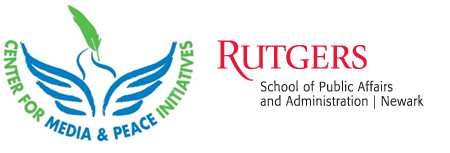 Gershowitz Conference 2019
Gershowitz Conference 2019
“Media Capture and Drivers of Inequality: New Alliances and Partnerships”
September 27-28, 2019 | New York, NY
The 8th Annual Gershowitz Conference on Media and Democratic Governance co-sponsored by the Center for Media & Peace Initiatives, New York (CMPI) and the School of Public Affairs and Administration (SPAA) at Rutgers University Newark.
————————————————————
Gershowitz 2019 Call for Proposals
For eight years, the Center for Media & Peace Initiatives (CMPI) has partnered with the School of Public Affairs and Administration (SPAA) at Rutgers University Newark to organize the Gershowitz Conference on Media and Democratic Governance focused on the intersection of press, people, peace, and public policy.
Economists used the term “capture” after the global economic meltdown in 2008 to describe the failure of regulators to police the economy adequately. Likewise, the media is accused of being ineffective watchdogs in terms of policing drivers of inequality and social exclusion in contemporary society. The American journalist and author, David Swanson, writes that “matters of public and political interest routinely are oversimplified, personalized, trivialized, and dramatized,” and mostly at the expense of important issues that affect ordinary folks. We see dominant cultural narratives that undermine fairness, tolerance and inclusion. These narratives reinforce stereotypes in society, and play out in media coverage that stokes fear without understanding. In all these situations, the mass media provides a convenient means for manipulating public opinion, even when voters understand that the media can be biased. The media, partly due to the 24 our news cycle, is obsessed with the coverage of tweets from the powerful and the famous while obscuring the intentional policies and ingrained prejudices — that have over many decades tilted the scales in favor of some, while limiting opportunity for many others. Typical of media capture, journalists through cronyism or capitalism allow the rich to influence information published in the media at a cost: the exacerbation of inequality.
Reflecting the increasing polarization of society and the reality that achieving equity and fairness continues to be one of the most vexing challenges facing the world today, the theme of this year’s conference is “Media Capture and Drivers of Inequality: New Alliances and Partnerships.”
The three subthemes that constitute the tracks for the conference are:
Session 1: Identifying and changing policies, practices, and perpetrators of inequality in news organizations.
While news media practitioners may claim to be the defenders of the marginalized in society, social inequities fester throughout administrative and policy domains across government, non-profit organizations and the private sector. The extent to which media coverage exacerbates these inequities must be identified and ways found to address them in a fragmented media landscape. We invite submissions of fully formed panels and individual proposals that explore policies and practices impacting longstanding media-political complex, true participatory communication, and identifying the drivers of inequality in relation to political communication in America and beyond—as practiced these days by government officials, political figures, advocates for interests of all kinds, news reporters, and political pundits.
Session 2: Measuring and Assessing Media Coverage across Policy Areas.
Corruption, inefficiency, authoritarianism and constraints on the press are common. As a result, some journalists and political pundits are not acquainted with performance and integrity except as abstractions. Challenges to measuring and assessing social and information equity abound, including definitional ambiguity and varying perspectives as to what constitutes accuracy and fairness in reporting. Both qualitative evaluations and quantitative indicators are needed to measure and assess current conditions and temporal changes in journalism practice across different sectors. We invite submissions of fully-formed panels and individual proposals that look at current research, practical tools, and new approaches to measure and assess contemporary media practice in relation to promoting social equity.
Session 3: Information and Equity: Closing the gap between Africa and the World
In an era of global information abundance, the majority of the people in the world are still left out of the decision-making processes when it comes to making decisions that affect their lives in a direct or indirect manner. Disparities, dilemmas, and news flow challenges persist. In particular, emerging countries in Africa are facing challenges related to information inequities and imbalance in the flow of communication and information that undermine economic growth and development.
We invite submissions of fully-formed panels and individual proposals that explore: the extent that information is unfairly distributed in the world with a clear disproportional exclusion of issues of interest to Africa and other emerging countries; and papers that explore how people and development programs are denied such coverage in the dominant international media outlets. Last, papers that seek to address information equity relative to role of international corporate media are strongly welcomed as we seek to find mechanisms to support policies that promote more equitable information access and use.
Lessons learned from successful actions to mitigate and prevent information inequity can shape the participation of citizens in a democracy.
Call for Proposals
We invite you to submit an abstract to the 2019 Gershowitz Conference on Media and Democratic Governance by July 1, 2019 via CMPI -2019-call-for-proposals. The abstracts should be no longer than 200 words and should clearly state how the proposal fits into the subtheme selected. While we are interested in problem identification, we particularly encourage proposals with an action orientation. We are seeking conference participation from academics, practitioners, and students.
For more information visit: www.mycmpi.org Email: info@cmpimedia.org Tel: 1-833-267-3223
Center for Media & Peace Initiatives, New York
P.O. Box 384 10163, New York, NY


